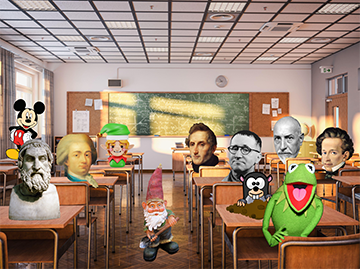Aida is presented in a version that, true to the traditions of nineteenth-century puppetry, provides for the presence of both song and acting. In a modification of Verdi’s opera, in response to the strong demand from the audiences that crowded Teatro Gerolamo, the choice has been made to end on a positive note; Radames and Aida do not die, instead escaping together towards their longed-for forests.
-
Teatro Grassi
In the repertoire of the Carlo Colla & Figli Puppetry Company, melodrama is always a great source of entertainment. In particular, Verdi’s melodrama, which guarantees a series of characters that find correspondence in the typical figures of puppet theatre, which are based on romantic archetypes where the hero, the heroine and the baddie are enough to create the show.
Aida has a theatrical structure similar to that of “opéra-comique”, in which dance provides a moment of entertainment and not part of the dramaturgy. In addition to all of this is the innocence typical of the world of puppetry, ensuring that the “heavenly Aida” can truly be dressed in celestial colours, the invaders are true “barbarians”, and that Amonasro is “ferocious” and Ramfis “evil”.
Then there is the triumphant scene, in which the use of puppets is completely free of regular rules and theatrical budgets and can easily generate a blend of hordes of wooden characters and exceptionally large animals.
The show is presented in a version that, true to the traditions of nineteenth-century puppetry, provides for the presence of both song and acting. Furthermore, in an overturning of Verdi’s opera, in response to the strong demand from the audiences that crowded Teatro Gerolamo, the choice has been made to end on a positive note; Radames and Aida do not die, instead escaping together towards their dreamed-of forests.
The play is part of a wider-ranging project that, in collaboration with the Piccolo, the Egyptian Museum of Turin and the Ricordi historical archive, examines the relationship between marionettes and opera on the occasion of the 150th anniversary of the Italian debut of Verdi’s Aida.
Duration: 115’ with an interval
In the repertoire of the Carlo Colla & Figli Puppetry Company, melodrama is always a great source of entertainment. In particular, Verdi’s melodrama, which guarantees a series of characters that find correspondence in the typical figures of puppet theatre, which are based on romantic archetypes where the hero, the heroine and the baddie are enough to create the show.
Aida has a theatrical structure similar to that of “opéra-comique”, in which dance provides a moment of entertainment and not part of the dramaturgy. In addition to all of this is the innocence typical of the world of puppetry, ensuring that the “heavenly Aida” can truly be dressed in celestial colours, the invaders are true “barbarians”, and that Amonasro is “ferocious” and Ramfis “evil”.
Then there is the triumphant scene, in which the use of puppets is completely free of regular rules and theatrical budgets and can easily generate a blend of hordes of wooden characters and exceptionally large animals.
The show is presented in a version that, true to the traditions of nineteenth-century puppetry, provides for the presence of both song and acting. Furthermore, in an overturning of Verdi’s opera, in response to the strong demand from the audiences that crowded Teatro Gerolamo, the choice has been made to end on a positive note; Radames and Aida do not die, instead escaping together towards their dreamed-of forests.
The play is part of a wider-ranging project that, in collaboration with the Piccolo, the Egyptian Museum of Turin and the Ricordi historical archive, examines the relationship between marionettes and opera on the occasion of the 150th anniversary of the Italian debut of Verdi’s Aida.
Duration: 115’ with an interval
Credits
Aida
abridged version of the opera by Antonio Ghislanzoni
organised by Eugenio Monti Colla
music by Giuseppe Verdi
recording by the NBC Symphony Orchestra, conducted by Arturo Toscanini, New York 1949
sets by Franco Citterio and Maurizio Dotti
costumes on the puppets designed by Eugenio Monti Colla and made by the tailoring shop of the Associazione Grupporiani
the costume for Aida is by Lila De Nobili
lighting by Franco Citterio
directed by Eugenio Monti Colla, continued by Franco Citterio and Giovanni Schiavolin
a ASSOCIAZIONE GRUPPORIANI – MILANO
Comune di Milano - Cultura - Teatro Convenzionato production
in collaboration with the Piccolo Teatro di Milano
Tickets
Category of performance Guest
Stalls full price € 25 | Discounted (under 26 and over 65) € 17 | Kids € 10
Balcony full price € 22 | Discounted (Under 26 and over 65) € 15 | Kids € 10
Subscriptions
The performance is available for subscription holders.
To purchase a subscription online, click here
How and where to purchase
For information, click here
COVID-19
Read the guidelines to access the activities
Organised groups and audiences
For information on tickets for organised groups:
tel. +39 02 72 333 216
email promozione.pubblico@piccoloteatromilano.it















